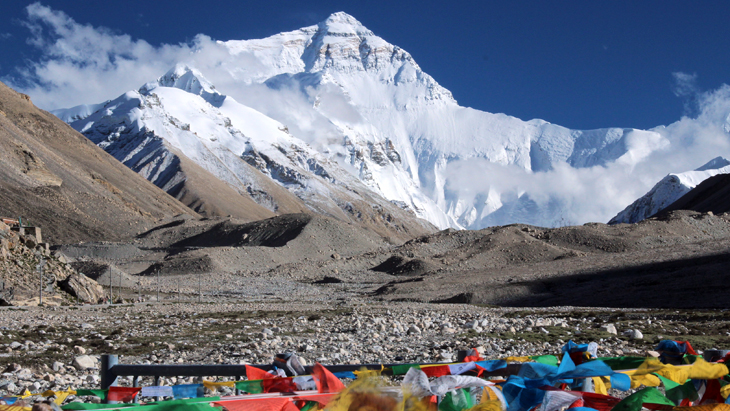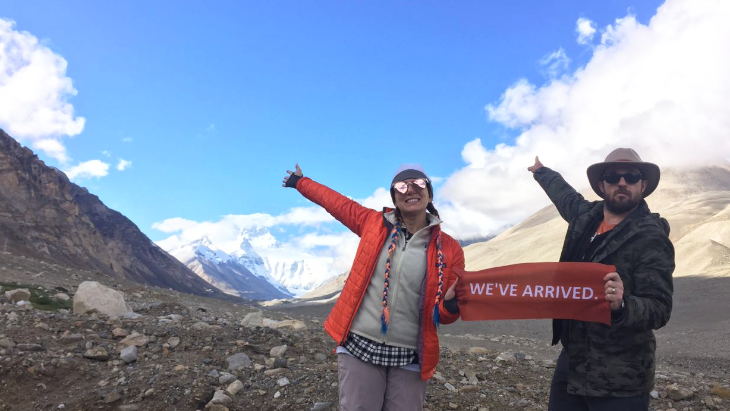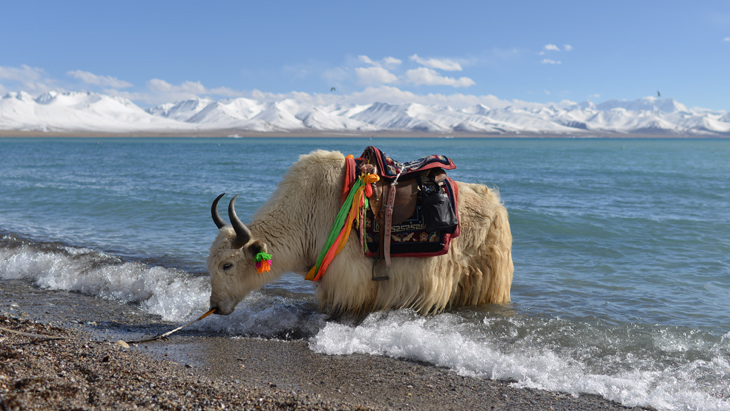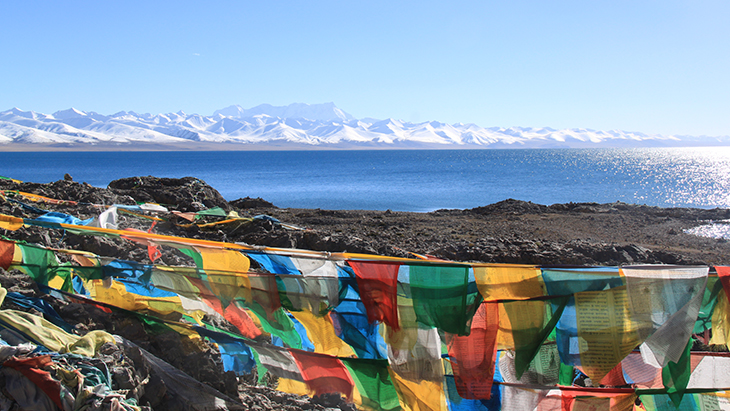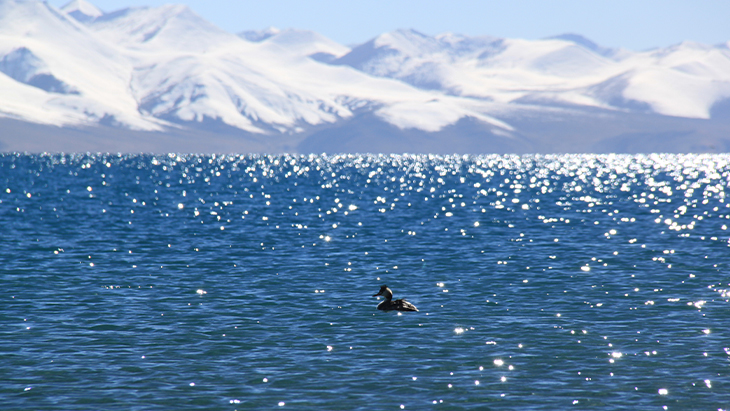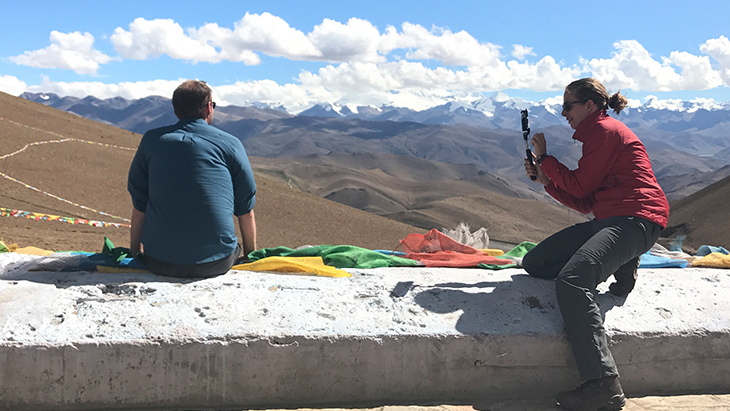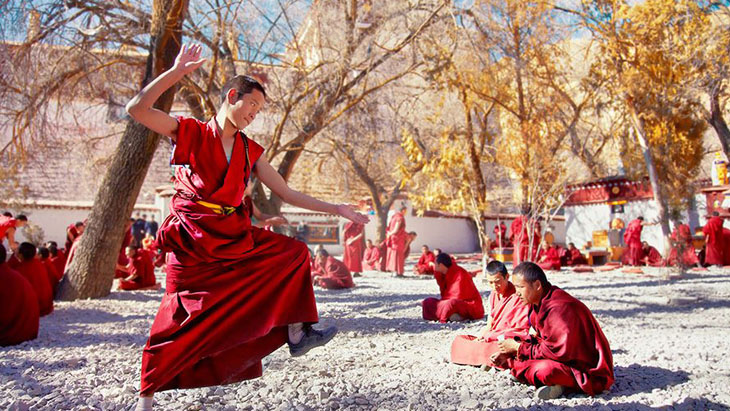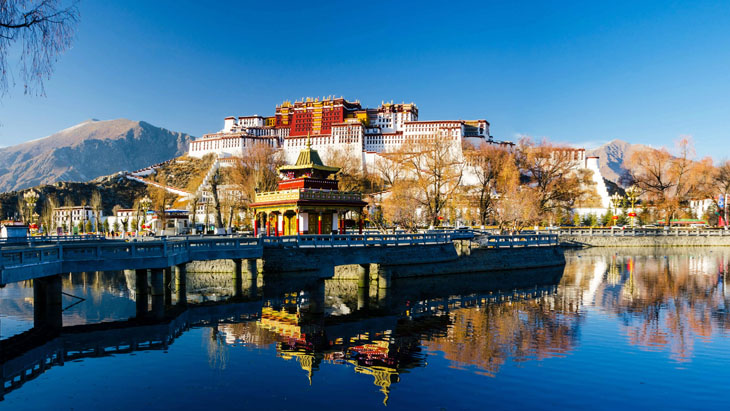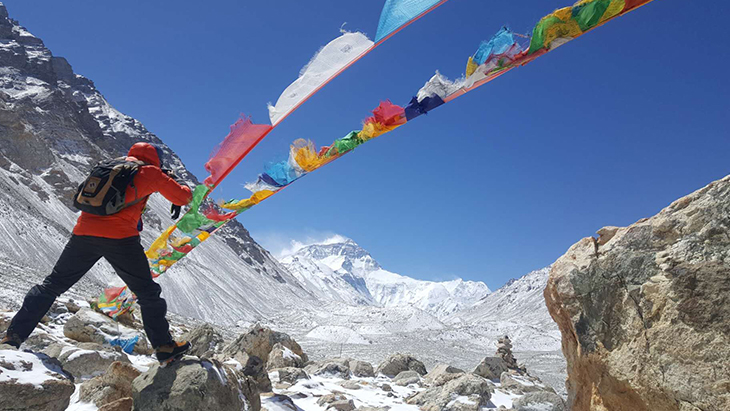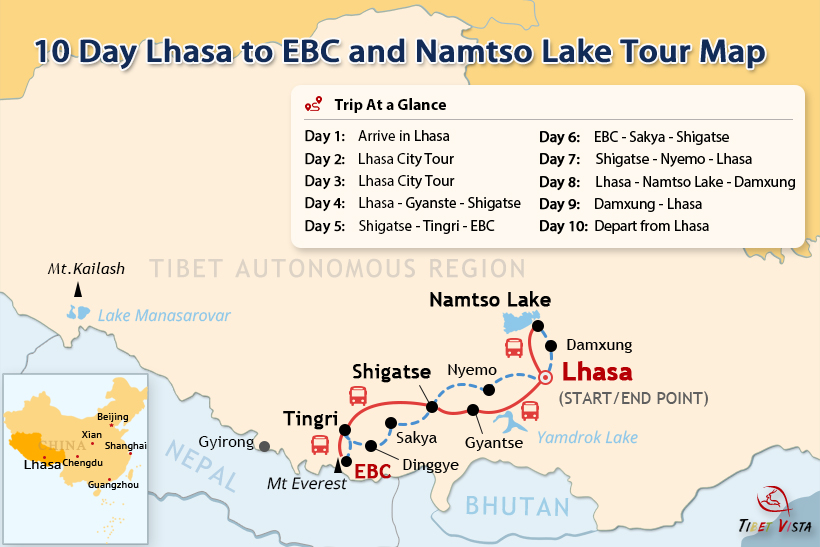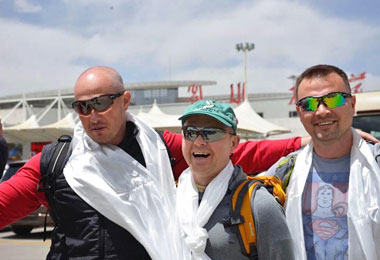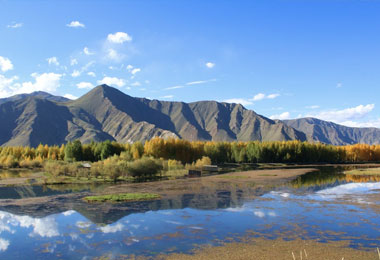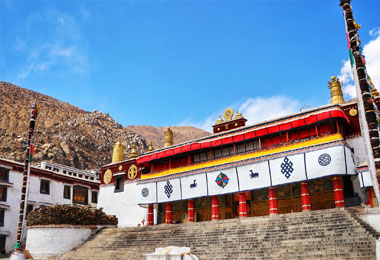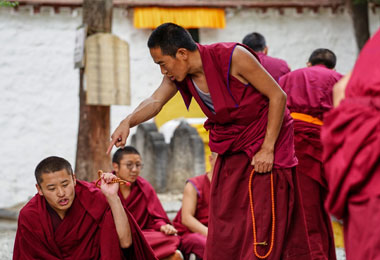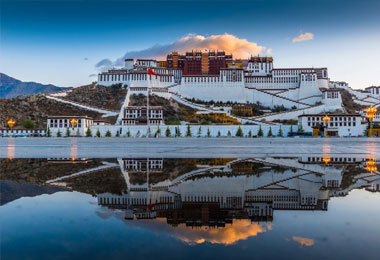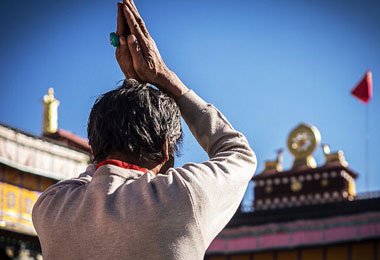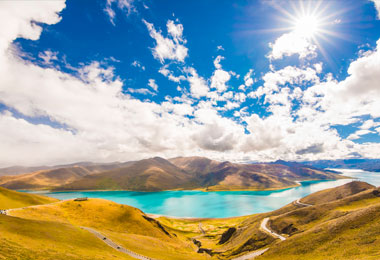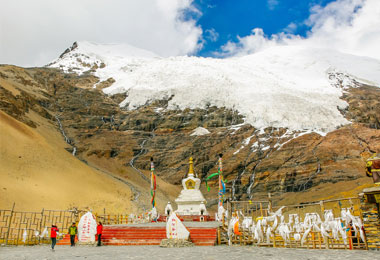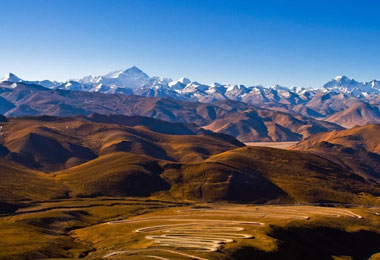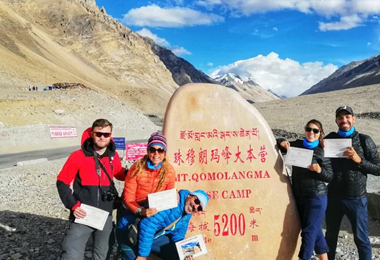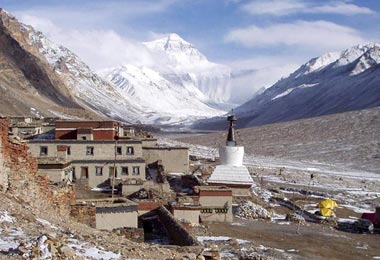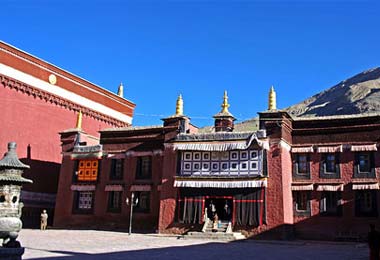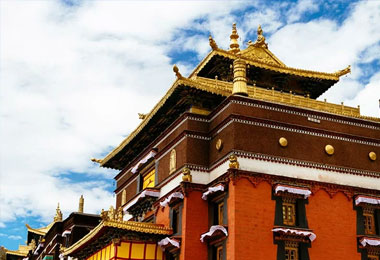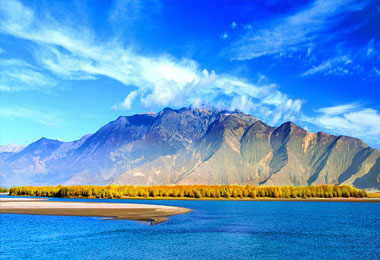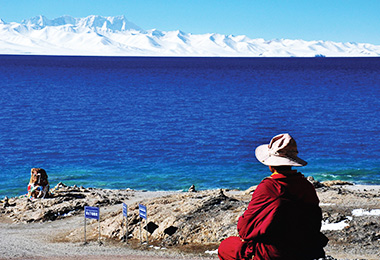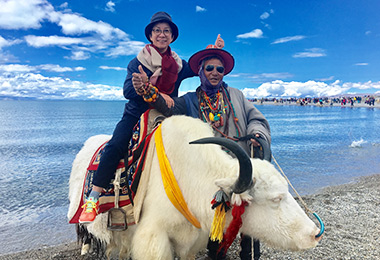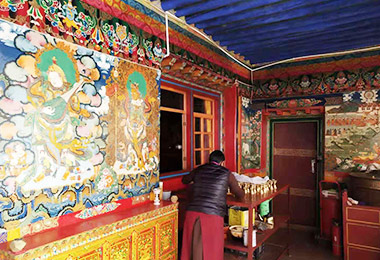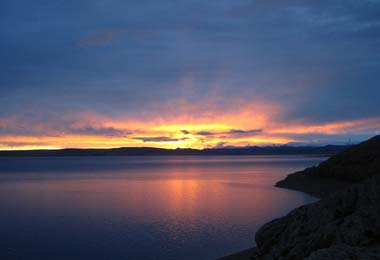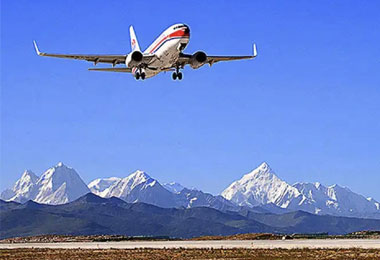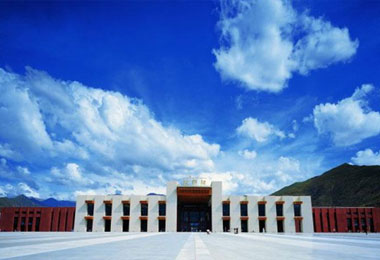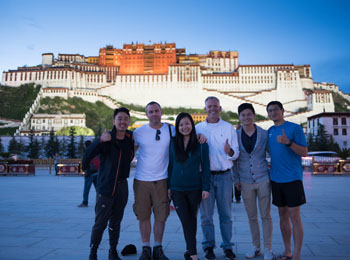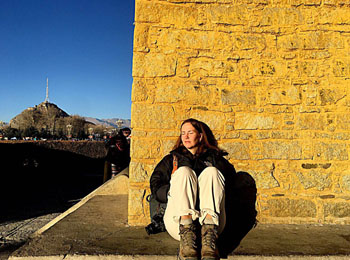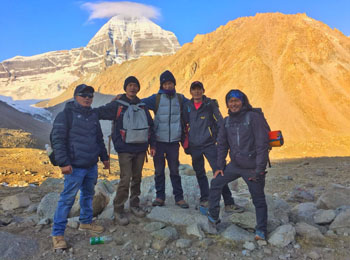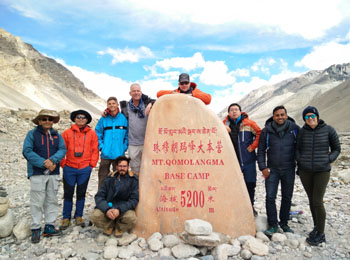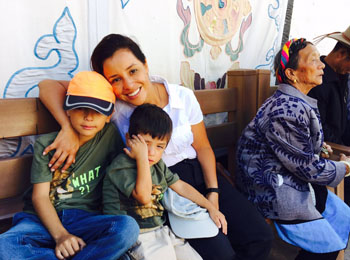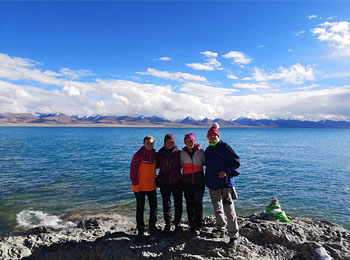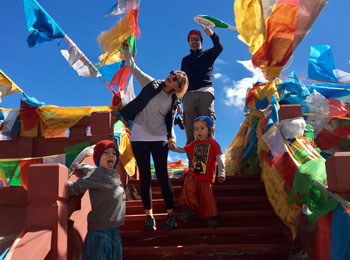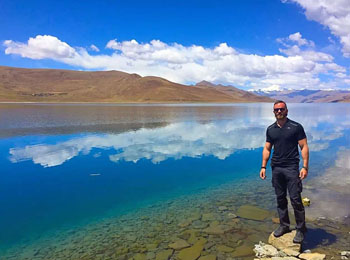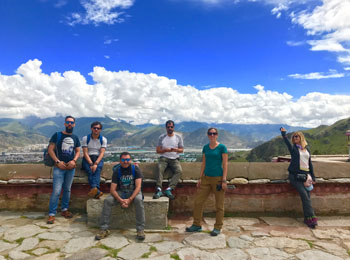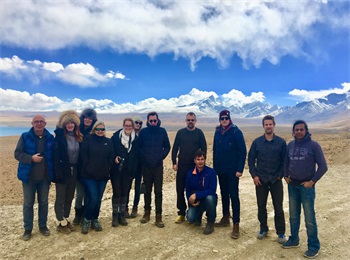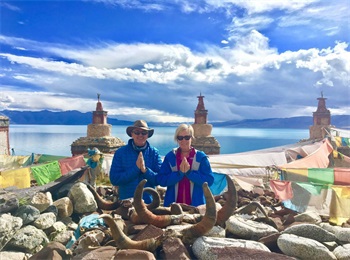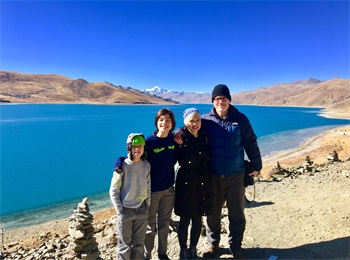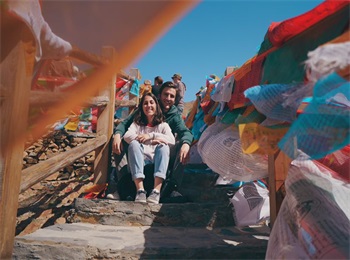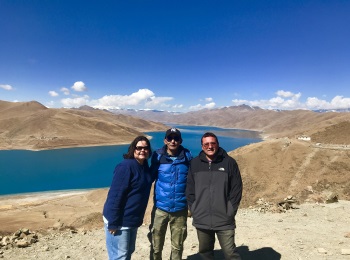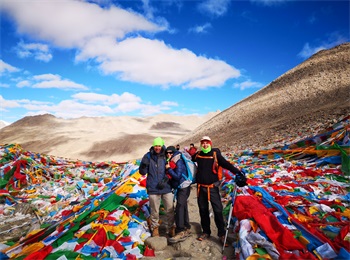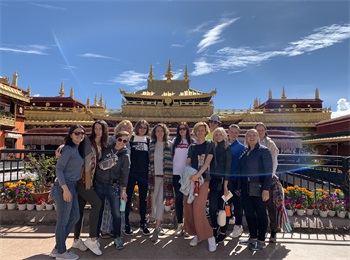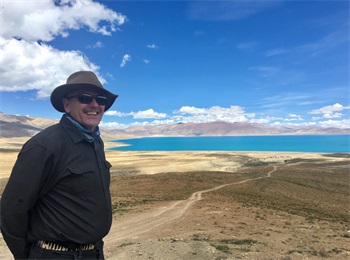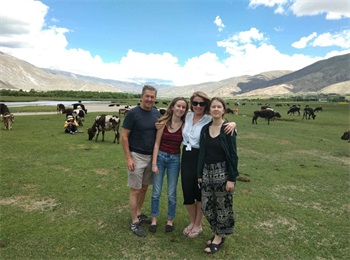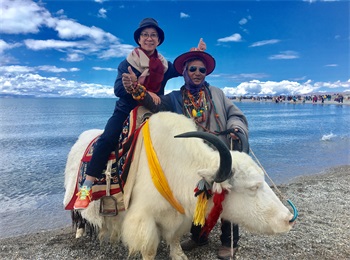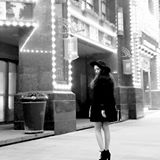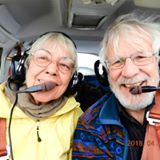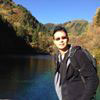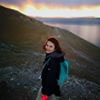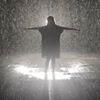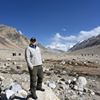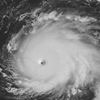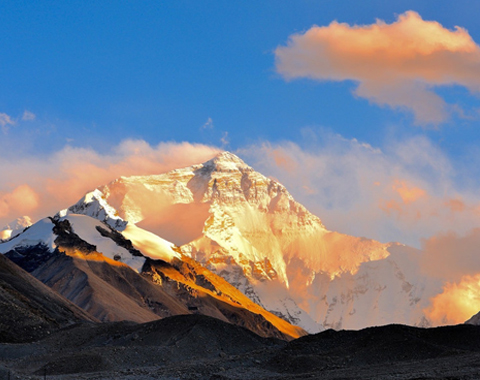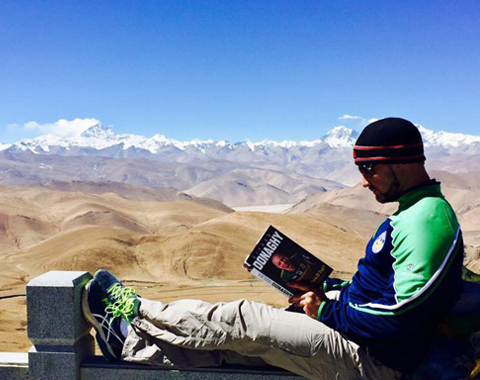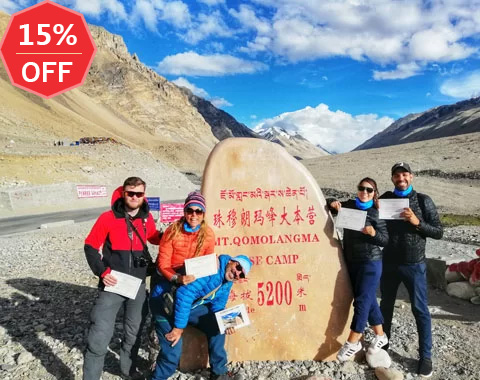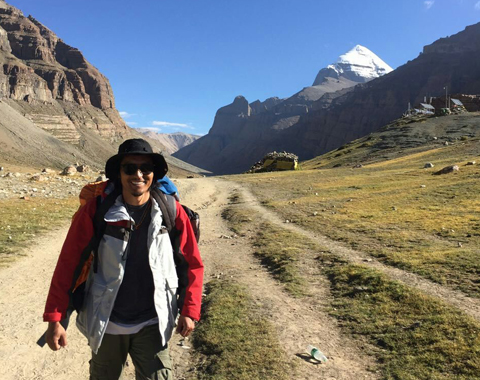10 Days Lhasa to Everest Base Camp and Namtso Lake Small Group Tour
Tour Route: Lhasa - Gyantse - Shigatse - EBC - Shigatse - Lhasa - Namtso Lake - Damxung - Lhasa

 Tour Code:
SG001B
Tour Code:
SG001B
 Tour Type:
Join-in Small Group Tour (Min 1 to Around 12) i
Tour Type:
Join-in Small Group Tour (Min 1 to Around 12) i
- Guaranteed Departures: Our tour dates are fixed, ensuring each departure is guaranteed.
- Flexible Scheduling: If you can't find a date that suits your travel plans, no need to worry. Simply let us know your preferred travel time, and we'll create a custom schedule, inviting others to join you.
- Non-shopping Experience: Embrace a non-shopping adventure with us. We promise high-quality tours, ensuring an authentic and enriching experience in Tibet.
 Tour Service:
Tibetan Local Tour Guide & Driver
Tour Service:
Tibetan Local Tour Guide & Driver
 Time to Vist:
Available All Year Around
i
Time to Vist:
Available All Year Around
i
- The best time to explore Mt. Everest and Lake Namtso are April, May, June, September, October, and November, offering pleasant temperatures for a comfortable experience.
- The busiest times/peak seasons are July, August, and October 1-8, coinciding with peak holiday seasons.
- From December to March marks Tibet's winter, an off-peak season. Mt. Everest enjoys clear weather during these months, providing excellent visibility. However, the road to Namtso Lake may be blocked due to heavy snow in winter.
 Trip Level:
Easy Trip for All Ages
i
Trip Level:
Easy Trip for All Ages
i
- This trip to Everest Base Camp and Lake Namtso is suitable for all fitness levels. While you will reach elevations exceeding 5000 meters, such as the Everest Base Camp (5200m) and the Lagenla Pass (5190m), our thoughtfully arranged tour allows ample time for acclimatization to the high altitude. Additionally, all our travel vehicles are equipped with oxygen tanks. It is advisable to consult your doctor for advice on whether high-altitude travel is suitable for you.

Combine the best scenery of Tibet in one go with a rich cultural experience as visiting local villages, teahouses, and monasteries.

10 Days from USD1289
- This price is based on double occupancy;
- This price is based on 3-star accommodation level in low season;
- This price doesn’t include the international airfare.
Overview & Highlights of this Trip
This 10-day Lhasa to Everest Base Camp and Lake Namtso tour is a thrilling odyssey, offering some of the most captivating Tibetan experiences that the region has to offer.
Starting from Lhasa, the journey unfolds as you delve into the holy city before embarking on a westward drive to Tingri, the gateway of the Everest region. You will pass through glaciers, lakes, farmlands, villages, and monasteries, reaching the depths of the Himalayas at the Everest Base Camp (5200m). Witness breathtaking sunrises and sunsets and gaze upon the stars from the top of the world.
Then, you will extend your journey to Damxung Grassland, located 220 kilometers north of Lhasa, where the enchanting Namtso Lake awaits. Marvel at the vastness of Lake Namtso, resembling a sea embraced by the boundless Nyechen Tanglha Mountain. Amidst the grasslands of northern Tibet, encounter scattered local nomads tents, and flocks of yaks and sheep.
This is not only an overland journey across the Tibetan Plateau but also an unforgettable experience to discover the breathtaking natural landscapes with the rich tapestry of humanity.

Highlight 1 of this Trip: Stay overnight at the Everest Base Camp in Tibet and enjoy sunrise and sunset over Mt.Everest.

Highlight 2 of this Trip: Admire the Potala Palace, the UNESCO World Heritage Site and the landmark of Lhasa.

Highlight 3 of this Trip: Follow the ancient Barkhor Kora route around the Jokhang Temple.

Highlight 4 of this Trip: Appreciate the breathtaking scenery of the holy Namtso Lake.

Highlight 5 of this Trip: Visit Tsurphu Monastery, the birthplace of the renowned reincarnation system for living Buddhas in Tibetan Buddhism.

Highlight 6 of this Trip: Witness Monks debate in Sera Monastery.

Highlight 7 of this Trip: Experience the daily life of local Tibetans in the traditional Tibetan Teahouse.
Itinerary Details
Trip at a Glance
Day 1: Lhasa Arrival
Day 2: Lhasa Day Tour
Day 3: Lhasa Day Tour
Day 4: Lhasa - Gyantse - Shigatse
Day 5: Shigatse - EBC
Day 6: EBC - Sakya - Shigatse
Day 7: Shigatse - Nyemo - Lhasa
Day 8: Lhasa - Namtso Lake - Damxung
Day 9: Damxung - Lhasa
Day 10: Lhasa Departure
Day 1: Arrival in Lhasa
Welcome to Lhasa (3650m)!
When you arrive in Lhasa, whether by train or flight, our friendly Tibetan guide will greet you with a Hada (the traditional Tibetan ceremonial scarf) and warm blessings.
Then, the guide and the driver will take you to your hotel in downtown Lhasa. You may view the Yarlung Tsangpo River/Brahmaputra River (the Longest and largest river in Tibet) and Lhasa River.
After settling into your hotel, take some time to rest and adjust to the high altitude.
In the afternoon or evening, your guide will meet you with traditional Tibetan gifts, provide travel instructions, and introduce your group members.
If you need any help or specific needs, feel free to visit our service center at Lhasa Gang-Gyan Hotel.
Stay overnight in Lhasa.
 Overnight in Lhasa
Overnight in LhasaDay 2: Lhasa Tour - Drepung Monastery and Sera Monastery (B, D)
Today is Tibetan Monastery Day! You’ll have a full day to explore the largest monastery in Tibet, delve into the knowledge of Tibetan Buddhism, and immerse yourself in the daily life of Tibetan monks.
In the morning, you’ll explore the largest monastery in Tibet - Drepung Monastery, which was once the home to over 10,000 monks. As you walk through the Coqen Hall, your guide will provide detailed explanations of the worldview of Tibetan Buddhism and introduce notable figures in Tibetan Buddhist history.
Next, you’ll visit the renowned Loseling College (or an equivalent), offering a glimpse into the study and life of Tibetan monks. Explore their dormitories to gain insights into the Tibetan monks' daily routines and living conditions.
In the afternoon, you’ll head to Sera Monastery, another of the ‘great three’ Gelug monasteries of Tibet, to witness the famous Tibetan Monks Debate (15:00 - 17:00, from Monday to Saturday). Your guide will intricately explain how Tibetan monks engage in these debates to acquire knowledge and advance in their academic degrees.
After today’s tour, enjoy a welcome dinner with your group members.
 Overnight in Lhasa
Overnight in Lhasa Breakfast | Welcome Dinner
Breakfast | Welcome DinnerDay 3: Lhasa Tour - Potala Palace, Jokhang Temple, Barkhor Street (B)
Today’s Highlight is a visit to UNESCO World Heritage Sites Potala Palace and Jokhang Temple, providing a glimpse into the daily beliefs and lives of the people of Lhasa.
After breakfast, your first stop is the Potala Palace, where you can enjoy a panoramic view of the Lhasa Old Town. Discover the lives and stories of the Dalai Lamas through history within the palace, and the extraordinary treasures it holds. The most valuable collections of Potala Palace are the gilded burial stupas of former Dalai Lamas and the meditation cave of the 33rd great king of Tibet.
After touring the Potala Palace, you will visit Longwangtan Park at the foot of the Potala Palace. Here, you can appreciate the majestic Potala Palace from a different perspective and engage in local Tibetan folk activities.
In the afternoon, you will head to the heart of Tibetan religion - the Jokhang Temple. Inside you can see the statue of Buddha Sakyamuni at the age of twelve. Outside, you can see pilgrims making prostrating in front of Jokhang Temple. Around the temple is Barkhor Street, where you can do kora (a religious circle of a building or mountain) with pilgrims and locals, and explore the old market.
Next, follow your guide to one of the liveliest indoor Tibetan tea houses in Lhasa. Sip traditional Tibetan sweet tea alongside local Tibetans as your guide shares insights into Tibetan social dynamics and daily life.
Stay overnight in Lhasa.
 Overnight in Lhasa
Overnight in Lhasa Breakfast
BreakfastDay 4: Lhasa to Shigatse via Gyantse (B, L)
In the morning, start the overland journey from Lhasa to Shigatse, which includes visits to Tibet's most beautiful lake, glacier, and a charming Tibetan village.
First, drive over the Gampala pass (4790 m) to catch a glimpse of Yamdrok-tso (4400m). The Yamdrok Lake is surrounded by many snow-capped mountains and in the distance you can have spectacular views of Holy Mount Nyenchen Khangsar (7191m), the highest mountain near Lhasa. Continue to explore the lakeshore from various viewpoints, and at the end of the lake, you could visit a local family in the village and have lunch with the locals.
Next, you will pass and enjoy the Korola Glacier on the roadside. It is the largest glacier in Tibet. As you see the ice tongue of the glacier climb the entire hillside, you will feel the magical power of nature.
Then, continue your journey to Gyantse. On the way, you will stop at Simila Mountain Pass, where you can hang prayer flags to pray for world peace and the health of your family.
After arriving in Gyantse, you can spend some time taking photos of the ancient city of Gyantse. From Gyantse to Shigatse, you will pass by green (in summer) and golden (in autumn) Tibetan barley fields and countless farms.
Finally, we arrive in Shigatse, the second largest city in Tibet. After checking in to the hotel, you can take a good rest and prepare for the next day’s trip to Mount Everest.
Stay overnight in Shigatse.
 Overnight in Shigatse
Overnight in Shigatse Breakfast | Lunch
Breakfast | LunchDay 5: Shigatse to Everest Base Camp (B)
Take the most use of your time today to admire the stunning Himalayan mountain ranges!
After breakfast, you will head directly to Mount Everest.
First, you will pass Gyatsola Pass (5280m). At Gyatsola Pass viewpoint, you’ll catch your first glimpse of Mount Everest. Hidden behind the mountain range, the Everest resembles a budding lotus flower, a captivating sight along the roadside.
Shortly after we enter Mount Everest National Nature Reserve, you will enjoy the panoramic view of the Himalayas at Gawula Pass (5198m). At this viewpoint, you will marvel at the majestic lineup of the five highest peaks in the Himalayas, including Everest at the forefront. This is your second glimpse of Everest.
Then we drive along the new zigzag road to Everest Base Camp (5200m). As you get close to the base camp, the majestic Everest gradually unfolds before you, drawing nearer with each winding turn. This marks your third view of Everest.
Upon reaching Everest Base Camp, the colossal white pyramid peak of Mount Everest stands towering before you. As the day transitions to dusk, witness the golden hues of the sun casting a warm glow on Everest's northern face—your fourth view.
As night falls, the sparkling Milky Way and the snow-white peak of Mount Everest reveal your fifth and final encounter with Everest.
Stay overnight at Everest Base Camp or in the local village near EBC if the EBC tent hotels are closed during the winter season.
Insider Tips:
1. The visibility of Everest is subject to weather conditions and cannot be guaranteed.
2. During the winter season, typically from November to March, the tent hotels at Everest Base Camp close. Therefore, if you’re traveling in winter, your accommodation options are limited to the village near EBC.
 Overnight at EBC or in the village near EBC
Overnight at EBC or in the village near EBC Breakfast
BreakfastDay 6: EBC to Sakya via Dinggye and return to Shigatse (D)
Today, you will retrace the journey along the Himalayas and return to Shigatse. Once again savoring the beauty of the Himalayan mountain range.
In the morning, before departing from the base camp, you will visit Rongbuk Monastery, the world’s highest monastery, where nuns and monks live together at 5154 meters above sea level.
Then, you'll return to Shigatse via Dinggye, taking an alternative Himalayan route different from the traditional path. Here, you’ll stop at the Dinggye Xilin Viewpoint. You can not only see the majestic eastern slope of the towering Mount Everest again, but also the world's fourth-highest peak, Mount Lhotse, standing at an elevation of 8,516 meters. Additionally, you can enjoy the vast and delightful wetland landscape at the foot of Mount Everest.
Next, you’ll make a brief stop in the ancient town of Sakya to stroll around Saga Ancient Town.
Finally, you’ll arrive in Shigatse. Upon arrival, your guide will lead you to a local Langma Hall, a local venue for Tibetan song and dance performances. Here, you can witness the traditional Tibetan performances and celebrate the success of your lifetime Mount Everest journey during dinner with your fellow group members.
Stay overnight in Shigatse.
 Overnight in Shigatse
Overnight in Shigatse Dinner
DinnerDay 7: Shigatse to Lhasa via Nyemo (B)
Today's main attraction is a visit to Shigatse's largest monastery, the Tashilhunpo Monastery. Later, you'll return to Lhasa along the Yarlung Tsangpo River.
In the morning, we will visit the home of Panchen Lama - Tashilunpo Monastery. The grand and magnificent halls of the largest local monastery occupy the entire hillside. This is the spiritual home of the Tibetan people in Shigatse, housing the world's largest statue of Maitreya Buddha. Inside, you will see monks adorned with yellow hats and red robes, moving about the temple.
Next, we will return to Lhasa along the Yarlung Tsangpo River, the mother river of the Tibetan people.
Finally, you will arrive in Lhasa. Enjoy leisure time wandering freely through Barkhor Street, where you can shop for gifts to bring back home for your family.
Stay overnight in Lhasa.
 Overnight in Lhasa
Overnight in Lhasa Breakfast
BreakfastDay 8: Lhasa to Namtso Lake to Damxung (B)
This is the day of holy Lake Namtso!
In the morning, heading north from Lhasa, you’ll pass through the vast prairie in Damxung, where you can see the closest nomads area to Lhasa, with herds of yaks and sheep. Besides, you can also enjoy the view of the Qinghai-Tibet railway against the backdrop of snow-capped mountains.
While crossing the snow-capped Nyenchen Thanglha Mountain Rainges, pause at the renowned Lagenla Pass (5190m) to marvel at the stunning vista of holy Namtso Lake from a distance. Descend the road to reach today’s destination, Namtso Lake, one of the ‘Three Holy Lakes’ in Tibet.
Upon reaching the lake, you can enjoy your time doing a leisurely trek around Tashi Dor Island and along the lakeshore. For a panoramic view of Namtso Lake, climb to the top of the hill on Tashi Dor Island, where the circular lake resembles a boundless blue sea surrounded by snow-capped mountains.
Marvel at the magical stone pillars and peaks, and explore meditation caves and Buddhist holy sites on the island with your travel guide.
After visiting Namtso Lake, you will return to Damxung via the mountain pass.
Stay overnight in Damxung.
Insider Tips:
1. If the majority of your group is interested in witnessing the beautiful sunset at Namtso Lake, you can stay longer for the sunset. While you wait, we’ll provide hot coffee or Tibetan sweet tea.
2. Due to the higher altitude of Lake Namtso, standing at 4718 meters above sea level, it tends to be colder than Lhasa. It is advisable to bring a warm jacket with you for today’s visit.
 Overnight in Damxung
Overnight in Damxung Breakfast
BreakfastDay 9: Damxung to Lhasa via Chimelong Nunnery and Tsurphu Monastery (B, L)
Today, you’ll have a cultural excursion to the off-the-beaten sites on the way back to Lhasa!
After breakfast, you will first visit Chimelong Nunnery (Phyirmil Lung Nunnery), the largest nunnery near Lhasa. Roam over the peaceful nunnery and get an idea of different Buddhist studies in Tibet, you may also spot a sky burial site (Tibet funeral site) in the distance.
Then, head to Tsurphu Monastery, the oldest monastery in Tibet. It is the seat of the Karmapa branch of the Kagyupa order of Tibetan Buddhism and is also the birthplace of the system of reincarnated living Buddhas in Tibet. Here, you can learn more about the ‘Black Hats', the Karma Kagyupa school of Tibetan Buddhism.
During the summertime (June to September), you have the option of enjoying a 'Linka outing' (Tibetan-style picnic) for lunch in the small village at the foot of the hill of Tsurphu Monastery. Alternatively, you can have lunch at the restaurant of Tsurphu Monastery.
At the end of the day, return to Lhasa.
Stay overnight in Lhasa.
 Overnight in Lhasa
Overnight in Lhasa Breakfast | Lunch
Breakfast | LunchDay 10: Depart from Lhasa (B)
Today marks the end of your Tibet tour.
Please make sure to verify your departure flight/train details with our guide in advance. And your guide will take you to the airport or train station.
Thank you for choosing Tibet Vista, and we extend a warm welcome for your return to Tibet in the future.
 Breakfast
BreakfastTour Cost & Schedule in 2024
| Class/Price for P.P | Nov.1 to Next Feb.28 | Mar.1 to May 31 | Jun.1 to Jul.9 | Jul.10 to Aug.20 | Aug.21 to Sept.19 | Sept.20 to Oct.10 | Oct.11 to Oct.31 |
|---|---|---|---|---|---|---|---|
| Economic Class | 1289 US$ | 1319 US$ | 1369 US$ | 1419 US$ | 1369 US$ | 1419 US$ | 1319 US$ |
Please Note:
If you couldn’t find a tour date suitable for your travel schedule in the above form, please contact our travel experts and they will help you plan a delightful vacation to Tibet at the BEST local price.
Discount:
1.) 5% off for those booking the tour together with other two travelers (3 or 3 above in total) at the same time;
2.) 5% off for those booking the tour 3 months in advance.
3.) Please kindly be aware that the two discounts mentioned above cannot be enjoyed simultaneously.
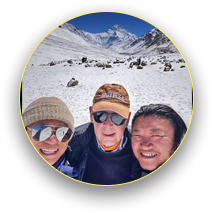
From Tibet travel permits to local accommodations and transportation, we've got you covered. While train and flight tickets to Tibet are not included, we ensure seamless and 100% guaranteed booking for your convenience.
Your Tibet tour experience starts with us!
Price Inclusions:
Tibet Travel Permit and all required local travel documents for this tour (excluding expedited processing fees);
Local tour transfers, 5-29 seats comfortable tourist vehicle according to the group size;
All entrance ticket fees for all tourist sites listed in the itinerary;
All meals listed in the itinerary;
Knowledgeable English-speaking Tibetan local tour guide shared in your group (For prices of tour guides in other languages, please inquire);
All hotels listed in the itinerary or equivalent three-star hotels. Upgrades are available for an additional fee. (Single room supplement required when not sharing the room);
Free shuttle between Lhasa Railway Station and the downtown hotel according to your arrival/departure time.
Free shuttle between Lhasa Railway Station/Lhasa Gonggar Airport and the downtown hotel;
Service Charge & Government Taxes;
Arrangements including planning, handling, operational, and communication charges;
Tourist accident/casualty insurance;
Additional services include fine Tibetan souvenirs, a tourist map, portable oxygen, medical oxygen in the vehicle, bottled mineral water, and more.
Price Exclusion:
China Visa (If you need visa assistance services, especially for Chinese Group Visa from Nepal to Tibet, feel free to contact us for more details.);
International flight to and out of China;
Domestic flight/train to and out of Lhasa (If you need us to book the domestic flight/train tickets, please contact us for the details.);
Single Room Supplement: Hotels default to double occupancy with twin-bedded rooms. If you prefer a single room or room sharing isn't possible, a single room supplement is necessary. Please consult the travel consultant for specific pricing details.
Meals not listed in the itinerary;
Tips for the guide and driver. If you are satisfied with their service, it is suggested to tip $7 (50 RMB) per day per person to be shared between the driver and the guide;
Other expenses caused by force majeure events (such as natural disasters, traffic control, loss of valuables, visa delays, flight delays or cancellations, etc.);
Personal expenses, like laundry, phone calls, snacks, soft drinks (please do your best to avoid alcoholic beverages during your Tibet trip), optional tour activities, etc.
Everest Base Camp and Namtso Lake Trip Notes
To ensure a smooth journey, it is recommended to book the tour at least 15-20 days before departure.
Of course, booking 1 or 2 months or even earlier will help us apply for necessary travel documents on your behalf and make advance reservations for accommodations.
Additionally, early booking provides the opportunity to enjoy early bird discounts.
The earlier you book, the better prepared you'll be, and you won't be troubled in a rush.
Before you leave, make sure to get your Chinese Visa and Tibet Travel Permit in advance so you can enter the Tibet Autonomous Region.
Some other local travel documents, like the Alien’s travel permit for visiting areas outside Lhasa, can be obtained upon your arrival in Tibet.
We’ll take care of Tibet Travel Permit, as well as other local travel documents as part of our tour package. Simply follow our guidance, and there’s no need to worry about the process.
Once you book your Tibet tour with us, simply provide scanned copies of your Chinese Visa and a valid passport (with at least 6 months of validity).
If you traveling with a work visa, you will need proof of employment in China, and a study visa requires proof of your study in China.
Generally, it takes 7-14 working days to process the Tibet Travel Permit. Once the permit is successfully issued, we will mail it to your address in China 3-5 days before your Tibet trip, ensuring you can smoothly board the train or flight to Tibet.
While Lhasa sits at an altitude of 3650 meters above sea level, Lake Namtso is at an elevation of 4718 meters. The highest point during this journey is the Lagenla Pass at 5190 meters before reaching Lake Namtso. The Everest Base Camp in Tibet sits at an altitude of 5200 meters above sea level, making it one of the highest points in this journey.
For first-time visitors to such high-altitude regions, mild symptoms of altitude sickness, such as dizziness and headaches may occur.
However, there is no need to worry. Our specially designed 8-day trip from Lhasa to Everest Base Camp ensures a gradual acclimatization. You’ll spend 2-3 days exploring Lhasa at an altitude of 3650 meters before moving on to higher altitudes like Shigatse (3800 meters) and Everest Base Camp (5200 meters).
According to our experience, most tourists can adapt well to the increase in altitude through such an itinerary, and severe altitude reactions are rare.
If you experience severe symptoms at the base camp, such as intense headaches or difficulty breathing, use oxygen immediately, inform your guide, and seek medical attention promptly.
If necessary, our guide will assist in transferring you to a lower altitude location, such as Zhaxizong Township or Tingri County.
The best time to visit Mount Everest and Lake Namtso is in Spring (April to early June) and Autumn (September to October), offering favorable weather, pleasant temperatures, and reduced rainfall for clearer views of Mount Everest and enjoyable hikes around the holy lake.
Summer (July to August) is the rainy season in Tibet. While most rainfall occurs at night, it doesn't impact daytime activities. Just pay attention to the clouds and fog, which may potentially obstruct the full view of Mount Everest. This season is particularly ideal for appreciating the vast northern Tibetan grasslands, characterized by lush greenery and herds of yaks and sheep along the way to Namtso Lake.
Winter is also an option for visiting Mount Everest and Lake Namtso. Just be aware that between November and March, the region often gets snowfall, which can lead to road closures due to heavy snow. Therefore, whether you can visit Namtso Lake or not depends on the weather conditions.
Because of the high altitude and unpredictable weather, you might not always see the top of Mount Everest in bad weather. But don’t worry. We’ve designed this route that gives you four chances to witness Everest on your way, so you’re likely to catch a good view.
To increase your chances, consider visiting Mount Everest during spring or autumn when the weather is more stable. Feel free to check with our travel experts for the latest weather updates when planning your Everest Base Camp tour in Tibet.
Most importantly, stay positive, relax, and enjoy the journey. Don’t get too hung up on seeing the peak of Mount Everest. Even if you miss it, you’ll still experience amazing natural views and the unique landscapes of the Himalayas.
The overland expedition from Lhasa to Everest Base Camp is more than just about the mountain; it's an adventure into the wonders of the Tibet Plateau.
The road from Lhasa to Everest Base Camp boasts one of the finest in the region, mainly following the famous Sino-Nepal Friendships Highway which is fully asphalted.
Even the final stretch of 90 kilometers to Everest Base Camp is now covered with smooth pavement. You don’t need to worry about the bumpy road anymore.
The final part of the road from Lhasa to Lake Namtso goes through mountains, and during winter, some areas may get blocked by heavy snow. However, the rest parts are all well-paved roads.
In cities like Lhasa and Shigatse, accommodation options range from luxury 5-star to economic 3-star, allowing you to choose based on your budget and preferences.
However, at Everest Base Camp, the only accommodation option is the tent hotel, which offers quite basic lodging with relatively simple facilities. Most of the Tibetan-style tent hotels at Everest Base Camp feature dormitory-style sleeping arrangements.
During the winter season, the tent hotel will close, and accommodations need to be arranged in Zhaxizong Township or Tingri near the base camp.
Whenever you go to Everest and Lake Namtso, you need to prepare warm clothing for cold weather at such a high altitude.
It's advisable to wear outerwear that is easy to put on and take off, allowing you to adjust your clothing according to temperature changes.
For your upper body, consider layering with thick autumn clothing (or thermal underwear), a sweater or fleece, and a thick down jacket or windbreaker. Opt for windproof trousers and warm autumn trousers for the lower body. Choose non-slip sports shoes or hiking boots for your footwear.
Don't forget essentials like a scarf, gloves, and a hat.
Besides the clothes to take, here are some more things to prepare for your trip to Everest Base Camp.
Personal Care: Pack your essentials such as a toothbrush, toothpaste, facial cleanser, towels, and other personal toiletries. Since there are no shower facilities at Everest Base Camp, consider bringing wet wipes for convenience.
Skincare: Due to the dry climate in Tibet, pack lip balm, moisturizing cream, and hydrating masks to prevent skin dryness and cracking.
Sun Protection: Don’t forget to bring sunscreen and sunglasses for effective sun protection against the strong UV rays in Tibet.
Additional Necessities: Considering the long distances between attractions in Tibet, bring a U-shaped pillow for a comfortable journey. Also, having a thermal flask ensures you have hot water whenever needed.
Common Medications: Take essential medications like motion sickness pills, gastrointestinal medicine, anti-inflammatory drugs, cold medicine, and other medications for emergencies. Include adhesive bandages and eye drops. (Consult your doctor and carefully follow medical advice when taking medication.)
Electronic Devices: Bring your phone, camera, power bank, and any other necessary electronic devices. If you plan to bring a drone, check with our travel consultant in advance. Tibet operates on a 220V voltage.
Cash and Cards: Alipay and WeChat Pay are widely accepted in major cities like Lhasa and Shigatse. Credit cards can be used in some large hotels, restaurants, and shopping malls in Lhasa. However, in remote areas, cash may still be necessary. It's advisable to carry a small amount of Chinese yuan and at least one bank card with you.
Contact us for your dream trip now !
Enquire NowYou May Also Like:
-
![8 Days Lhasa to Everest Base Camp Small Group Tour]() 8 Days Lhasa to Everest Base Camp Small Group Tour: Marvel at Mt.Everest Real Close from 4 Different Viewing PlatformsView Details
8 Days Lhasa to Everest Base Camp Small Group Tour: Marvel at Mt.Everest Real Close from 4 Different Viewing PlatformsView DetailsFrom USD939 p.p
Tour Route: Lhasa - Gyantse - Shigatse - Everest Base Camp - Shigatse - Lhasa
Almost all the itineraries covering Everest Base Camp originate from this classic itinerary. The travel route to EBC involves all the awe-inspiring attractions, religious sites and magnificent natural wonder.
-
![7 Days Lhasa to Kathmandu Overland Small Group Tour]() 7 Days Lhasa to Kathmandu Overland Small Group Tour: Traverse from the North Side to the South Side of Mt.Everest for the Best of the HimalayasView Details
7 Days Lhasa to Kathmandu Overland Small Group Tour: Traverse from the North Side to the South Side of Mt.Everest for the Best of the HimalayasView DetailsFrom USD979 p.p
Tour Route: Lhasa - Gyantse - Shigatse - Everest Base Camp - Gyirong - Kathmandu
This tour combines the classic itinerary of visiting Tibetan cultural and natural beauty with a stopover in EBC. Tourists will finally end up in Kathmandu via Gyirong.
-
![8 Days Driving Across Himalaya Overland Adventure from Kathmandu to Lhasa]() 8 Days Driving Across Himalaya Overland Adventure from Kathmandu to LhasaView Details
8 Days Driving Across Himalaya Overland Adventure from Kathmandu to LhasaView DetailsFrom USD1069 p.p
Tour Route: Kathmandu - Gyirong - Everest Base Camp - Tingri - Shigatse - Gyantse - Lhasa
This 8 days Kathmandu to Lhasa tour involves all the amazing natural landscape and historical cultural sites with an epic road trip, including the Everest Base Camp, Yamdrok Lake, Tashilhunpo Monastery etc.
-
![15 Days Kailash and Manasarova Tour]() 15 Days Kailash and Manasarova Small Group Tour: A pilgrim’s final fantasy and the greatest overland trip in Tibet.View Details
15 Days Kailash and Manasarova Small Group Tour: A pilgrim’s final fantasy and the greatest overland trip in Tibet.View DetailsFrom USD2059 p.p
Tour Route: Lhasa - Gyantse - Shigatse - E.B.C - Saga - Kailash Trek - Darchen - Lake Manasarovar - Saga - Gyirong - Tingri - Lhasa
This is truly a journey to feel, magnificent temples, mountain passes, snow-capped peaks, nomad camps, pilgrims of Tibet. Start the trip from exploring the heart of central Tibet.
-
![6 Days Lhasa to Lake Namtso Small Group Tour]() 6 Days Travel to Sky Lake - Lhasa and Lake Namtso Small Group TourView Details
6 Days Travel to Sky Lake - Lhasa and Lake Namtso Small Group TourView DetailsFrom USD779 p.p
Tour Route: Lhasa - Namtso Lake - Damxung - Lhasa
This 6 days Tibet Group Tour covers major scenic spots in Lhasa, as well as sacred Lake Namtso and majestic mountainous range on the roof of the world.
Get Started - 10 Days Lhasa to Everest Base Camp and Namtso Lake Small Group Tour
You’re getting closer to your dream Tibet vacation! Fill out this form so our travel designers can start helping you plan a trip.
Privacy Policy: Your information is kept strictly confidential. Tibet Vista will never sell, trade, or give away your contact information to a third party.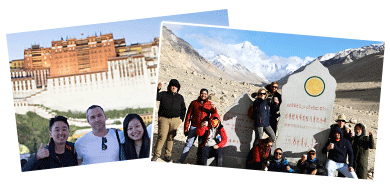

.jpg)



 View Trip
Map
View Trip
Map
 5.0
5.0 